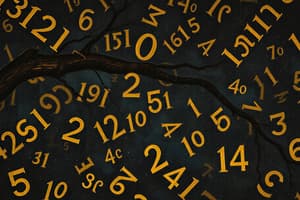Podcast
Questions and Answers
What is a complex number?
What is a complex number?
An ordered pair (x, y) with x ∈ R and y ∈ R.
The imaginary unit is denoted by ____.
The imaginary unit is denoted by ____.
i
How is addition of complex numbers defined?
How is addition of complex numbers defined?
(a, b) + (c, d) = (a + c, b + d)
How is multiplication of complex numbers defined?
How is multiplication of complex numbers defined?
The equation $z^2 + 1 = 0$ has roots in complex numbers.
The equation $z^2 + 1 = 0$ has roots in complex numbers.
What does $i^2$ equal?
What does $i^2$ equal?
Flashcards are hidden until you start studying
Study Notes
The Complex Numbers
- A complex number ( z ) is represented as an ordered pair ( (x, y) ) where ( x ) and ( y ) are real numbers.
- The real part of ( z ) is denoted as ( \text{Re} z = x ) and the imaginary part as ( \text{Im} z = y ).
- The set of complex numbers is denoted by ( \mathbb{C} ).
- The number ( x ) corresponds to the complex form ( (x, 0) ) and ( i ) represents ( (0, 1) ).
- A field isomorphism exists between the real numbers ( \mathbb{R} ) and a subset of ( \mathbb{C} ).
- Addition of complex numbers is defined as:
( (a, b) + (c, d) = (a + c, b + d) ) - Multiplication of complex numbers is defined as:
( (a, b)(c, d) = (ac - bd, bc + ad) ) - Commutative Properties:
- ( z_1 + z_2 = z_2 + z_1 )
- ( z_1 z_2 = z_2 z_1 )
- Associative Property:
( z_1 (z_2 + z_3) = z_1 z_2 + z_1 z_3 ) - Complex numbers can be expressed in the form ( z = x + iy ) by associating ( (x, 0) ) with ( x ) and ( (0, y) ) with ( iy ).
- The imaginary unit ( i ) satisfies the equation ( i^2 = -1 ).
- Division of complex numbers, where ( z \neq 0 ), is defined as:
( \frac{1}{z} = \frac{1}{x + iy} = \frac{x - iy}{x^2 + y^2} ) - This operation leads to results of the form:
( \frac{x_1 + iy_1}{x_2 + iy_2} = \frac{x_1 x_2 + y_1 y_2}{x_2^2 + y_2^2} + i\frac{y_1 x_2 - x_1 y_2}{x_2^2 + y_2^2} )
Studying That Suits You
Use AI to generate personalized quizzes and flashcards to suit your learning preferences.




